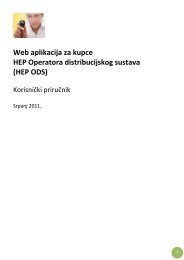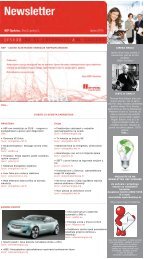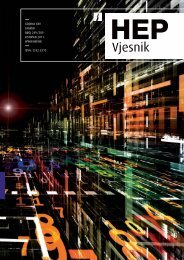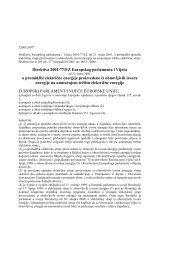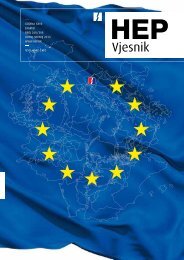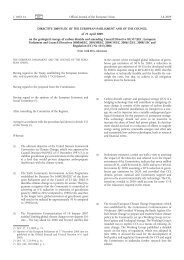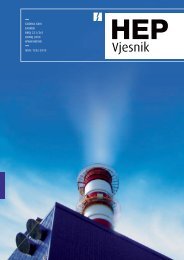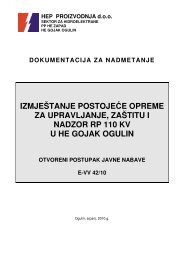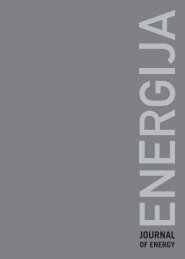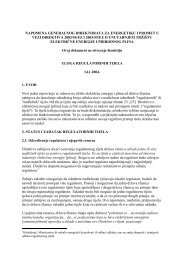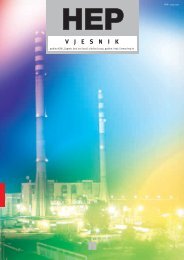You also want an ePaper? Increase the reach of your titles
YUMPU automatically turns print PDFs into web optimized ePapers that Google loves.
edu veliËina πteta nastalih oneËiπÊenjem glavnim<br />
makro-oneËiπÊivaËima. Ovi se podaci mogu uzeti<br />
kao polazna toËka pri ocjenjivanju utjecaja na<br />
okoliπ sveukupnog elektroenergetskog sektora.<br />
Posebna su tema stakleniËki plinovi. Naime,<br />
ocjena troπkova koji se pripisuju efektu staklenika<br />
i dalje je daleko nesigurnija nego πto je to sluËaj s<br />
takozvanim klasiËnim oneËiπÊivaËima.<br />
U konaËnici moæe se zakljuËiti kako negativni<br />
gospodarski utjecaj koji nastaje zbog raznih vrsta<br />
πtetnih emisija, iako ga je nemoguÊe precizno koli-<br />
Ëinski odrediti kao πto se to moæe promatrajuÊi<br />
dobra, cijene i usluge na træiπtu, ipak predstavlja<br />
polaziπte koje se nipoπto ne moæe i ne smije zanemariti.<br />
Danas je okoliπ najvaænije opÊe dobro Ëijim<br />
raspolaganjem putem zakonske regulative mora<br />
upravljati dræava.<br />
Na temelju reËenog, kad se nastoji definirati<br />
nacionalni program djelovanja tijela javne vlasti<br />
s ciljem smanjenja πtetnog utjecaja sustava<br />
proizvodnje i potroπnje elektriËne energije na<br />
okoliπ, svakako treba imati u vidu kako meappleu<br />
mnoπtvom moguÊih pravaca djelovanja postoji<br />
i opcija koriπtenja tehnologija proizvodnje koje<br />
okoliπu nanose manju πtetu kao i opcija pruæanja<br />
iste usluge uz manju potroπnju elektriËne<br />
energije.<br />
Odrednica koju se æeli postaviti za program djelovanja<br />
tijela javne vlasti u elektroenergetici polazi<br />
prije svega od sljedeÊih jednostavnih konstatacija:<br />
−<br />
−<br />
uπteda je najËiπÊa emisija,<br />
elektriËna energija proizvedena iz obnovljivih<br />
izvora energije, meappleu kojima valja posebno<br />
istaknuti i vrednovati koriπtenje otpada i<br />
biomase, u prosjeku ima manje πtetan utjecaj<br />
na okoliπ (poglavito kad je rijeË o makrooneËiπÊivaËima<br />
i emisijama stakleniËkih<br />
plinova) po generiranom kilovatsatu u usporedbi<br />
s klasiËnim izvorima; osim toga ovakva<br />
se proizvodnja pribliæava koncepciji odræivosti<br />
pa je kao takvu i preporuËuju smjernice i<br />
programi EU, a i neki najnoviji nacionalni<br />
propisi.<br />
©to se tiËe prve toËke, treba imati u vidu, ako<br />
do uπtede elektriËne energije dolazi promjenom<br />
troπila, da tada treba uzeti u obzir i njihov<br />
utjecaj na okoliπ. Drugim rijeËima, temeljitija<br />
analiza dobiti ostvarene u zaπtiti okoliπa zahtijeva<br />
provedbu jedne life cycle analysis (LCA)<br />
alternativnih rjeπenja.<br />
represents perhaps the most credible and most complete<br />
synthesis of the situation in this area, quantifies<br />
detrimental impact expressed in economic indices<br />
according to emitted units of pollution, in the same<br />
order of magnitude as for particles, sulfur oxides and<br />
nitrogen oxides. With a certain degree of caution<br />
when speaking about the reliability achieved in this<br />
study, it is deemed that the assessments of ExternE<br />
provide acceptable data regarding the degree of the<br />
magnitude of the damage that occurs due to pollution<br />
by the main macropollutants. These data can be taken<br />
as a starting point in assessing the environmental<br />
impact of the total electrical energy sector.<br />
Greenhouse gases are a separate topic. The estimated<br />
costs that are attributed to the effect of<br />
greenhouse gases continue to be far less certain than<br />
in the case of so-called classic pollutants.<br />
In the final analysis, it can be concluded that the<br />
negative economic impact that occurs due to various<br />
types of harmful emissions, although it is impossible<br />
to determine the precise amounts with the same<br />
degree of accuracy as when studying goods, prices<br />
and services on the market, nonetheless represents a<br />
starting point that cannot and must not be ignored.<br />
Today the environment is the most important common<br />
good that the government must manage via<br />
legal regulations.<br />
Therefore, when attempting to define a national<br />
program of activity for the institutions of the public<br />
authorities with the goal of reducing the detrimental<br />
environmental impact of the systems for producing and<br />
consuming electrical energy, it is certainly necessary<br />
to bear in mind that among the multitude of possible<br />
activities, there is also the option of using production<br />
technologies that are less detrimental to the environment,<br />
as well as the option of providing the same service<br />
with lower consumption of electrical energy.<br />
The determinant for a program of activity by the<br />
institutions of the public authorities in electrical<br />
energy starts first of all from the following simple<br />
conclusions:<br />
−<br />
−<br />
saving energy is the cleanest form of emission,<br />
electrical energy produced from renewable<br />
energy sources, among which it is necessary to<br />
point out and evaluate the use of wastes and<br />
biomass, on average has a less detrimental<br />
environmental impact (especially regarding<br />
macropollutants and greenhouse gas emissions)<br />
per generated kilowatt hour than classical<br />
sources. Moreover, such production approaches<br />
the concept of sustainability, and as such is<br />
recommended by the guidelines and programs<br />
of the EU, as well as some of the newest<br />
national regulations.<br />
De Paoli, L., ViπkoviÊ, A., Javna potpora razvitku obnovljivih..., Energija, god. 56(2007), br. 3., str. 328∑345<br />
De Paoli, L., ViπkoviÊ, A., Public support for the development..., Energija, vol. 56(2007), No. 3, pp. 328∑345<br />
334



